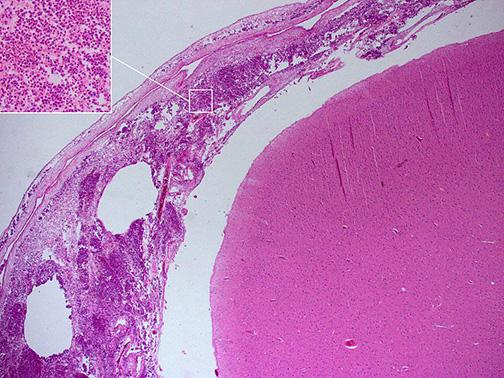Also written by Josie Villalta
Meningitis outbreaks in recent weeks at University of California, Santa Barbara and Princeton University have drawn attention to the disease in the context of large college campuses such as San Diego State.
UCSB has an undergraduate student population of nearly 21,000, whereas SDSU’s undergraduate student population is approximately 25,000. SDSU Graduate School of Public Health professor Richard Shaffer said the size of the student body is not as concerning as the strand of meningitis introduced.
The strands found at UCSB and Princeton are threatening because of their rarity, Shaffer said. The strain that caused the sudden outbreak is known as meningitis B. This type meningitis cannot be combatted with common meningitis vaccines, Shaffer said. He added that SDSU students shouldn’t worry about contracting meningitis B.
“Unless the few ill students from the other campuses came in close contact with a number of susceptible SDSU students, I wouldn’t expect that an outbreak of the same disease at SDSU is too likely,” Shaffer said
SDSU Student Health Services Director Gregg Lichtenstein said meningitis is caused by the inflammation of the membranes of a brain or spinal cord, resulting in the development of a bacteria, fungus or virus. Meningitis can be transmitted by nasal and oral secretion. However, it can’t be transmitted simply by being in the same room as an infected person and the primary way to prevent meningitis is through vaccination, Lichtenstein said. The vaccine is available through SHS for $91.
Students who live in the dorms have a higher risk of getting the virus than those who live off campus, Lichtenstein said. SDSU requires students to be vaccinated before occupying the dorms.
“When someone gets meningitis, the people around the patient have to receive a dose of an oral antibiotic and this antibiotic works very fast,” Lichtenstein said.
Only 3,000 people a year become sick from the bacteria, but Lichtenstein said the fatality rate of meningitis is 10 percent. Some warning signs of meningitis are a high fever, bad headache, spontaneous bruises on the body and a stiff neck, Lichtenstein said.
“Some prevention tips are to not share drinks, cigarettes, hookah or any other situation where you share oral secretion,” Lichtenstein said.
Journalism junior Vassili Demos said the meningitis vaccine policy should extend to all students attending SDSU.
”I feel that meningitis is horrible and such a deadly thing, and this comes from someone who has had family (member) that passed away from it,” Demos said. “I think it’s such a serious issue, and if you don’t have the vaccine it can make a huge difference.”
Shaffer said that routine health precautions should still be enforced.
“(Students) should do all of the normal good public health practices such as washing hands, sneezing into your sleeve (instead of your hand), trying to limit the number of people that you kiss, making sure you are vaccinated with the current meningitis vaccine, and generally trying to stay healthy, since you are more likely to catch this disease if you are already sick from something else,” Shaffer said.










